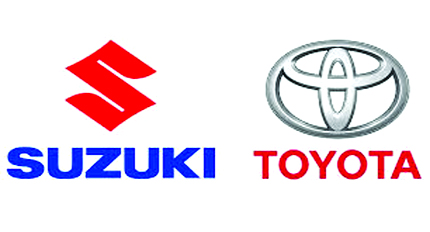
AFP, Tokyo :
Toyota said on Wednesday it will take a nearly five-percent stake in small-car specialist Suzuki Motor, the latest tie-up in the rapidly changing global auto industry.
The Japanese auto giant, maker of the Prius and Camry models, will pay some 96 billion yen ($907 million) for 4.94 percent of Suzuki.
The smaller partner in turn will buy Toyota shares worth 48 billion yen through the market, which amounts to roughly 0.2 percent of the firm.
Toyota and Suzuki had in 2017 signed a memorandum of understanding to discuss an operational tie-up.
The announcement comes as the global auto business undergoes dynamic changes, brought on by tougher environmental regulations, and new market entrants such as tech firms developing driverless vehicles.
These new factors posed “a turning point unprecedented in both scope and scale” for the business, the two firms said in a joint statement.
By teaming up, they will tackle “this transitional era” to promote tie-ups in new fields like autonomous vehicles.
Toyota offered engineering prowess, such as hybrid technology, while Suzuki, which enjoys enormous successes in India, has voiced concerns about staying competitive on its own.
Toyota is among the world’s biggest automakers, boasting brands like Lexus, but also small-car producer Daihatsu and truck maker Hino.
In 2017, Toyota signed a capital alliance with smaller rival Mazda. Toyota is also the biggest shareholder of automaker Subaru.
Toyota said on Wednesday it will take a nearly five-percent stake in small-car specialist Suzuki Motor, the latest tie-up in the rapidly changing global auto industry.
The Japanese auto giant, maker of the Prius and Camry models, will pay some 96 billion yen ($907 million) for 4.94 percent of Suzuki.
The smaller partner in turn will buy Toyota shares worth 48 billion yen through the market, which amounts to roughly 0.2 percent of the firm.
Toyota and Suzuki had in 2017 signed a memorandum of understanding to discuss an operational tie-up.
The announcement comes as the global auto business undergoes dynamic changes, brought on by tougher environmental regulations, and new market entrants such as tech firms developing driverless vehicles.
These new factors posed “a turning point unprecedented in both scope and scale” for the business, the two firms said in a joint statement.
By teaming up, they will tackle “this transitional era” to promote tie-ups in new fields like autonomous vehicles.
Toyota offered engineering prowess, such as hybrid technology, while Suzuki, which enjoys enormous successes in India, has voiced concerns about staying competitive on its own.
Toyota is among the world’s biggest automakers, boasting brands like Lexus, but also small-car producer Daihatsu and truck maker Hino.
In 2017, Toyota signed a capital alliance with smaller rival Mazda. Toyota is also the biggest shareholder of automaker Subaru.

